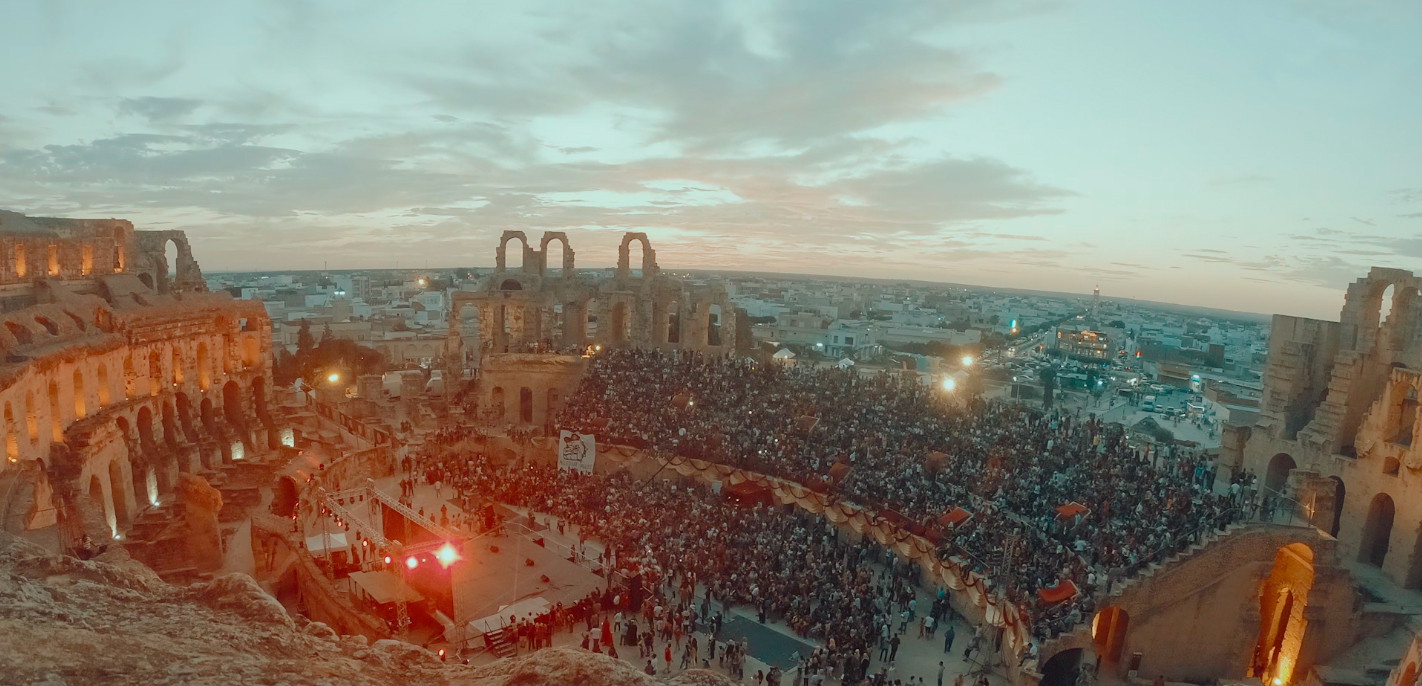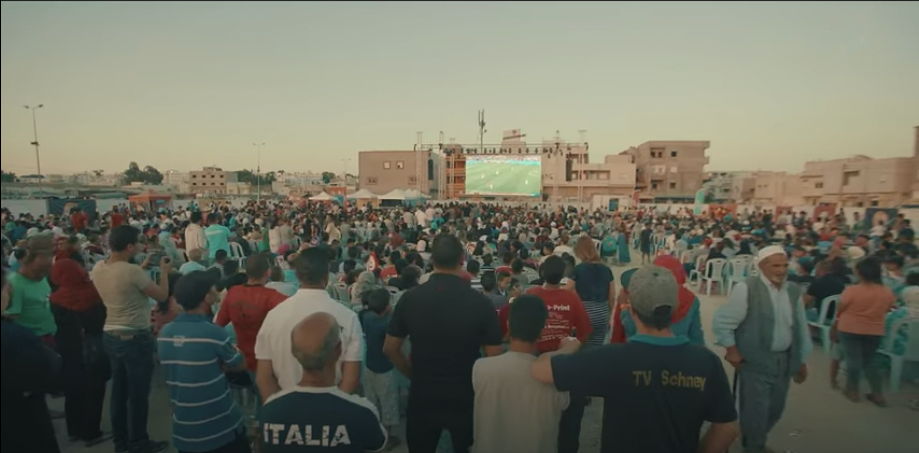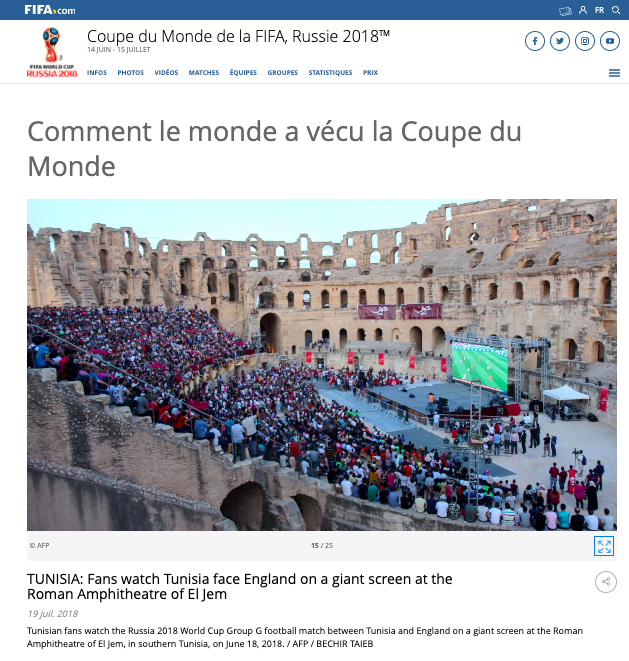In June 2018, during the football World Cup, Sélim Ben Hassen observed that the fan zones set up by the government were only located in the affluent areas of the capital city. He therefore decided to organise four events where people living in disadvantaged areas could come together and watch Tunisia’s matches in the tournament.
These events took place in four symbolic places:
– In the Mellassine district, the shanty town with the reputation of being the most dangerous one in the country;
– At Rejim Maatoug, one of the most remote villages in Tunisia, the last inhabited place on the edge of the desert;
– In the town of Kef, well known for supplying workers to factories and whose inhabitants have been looked down on for many years;
– In the amphitheatre of Jem, the second biggest Roman amphitheatre after the Coliseum in Rome, whose doors were closed for public events.
With the authorities predicting violence and chaos when these matches were screened, 600 volunteers, almost all of whom came from the regions where the events were to take place, joined the adventure and gave their all to ensure that the spectators enjoyed a wonderful day out.
More than 20,000 people attended these events. Not a single incident occurred, but smiles and harmony for citizens who are often deprived of the opportunity to celebrate with their families and community.



In Mellassine, a suburb of Tunis with a reputation as a cut-throat, the last match of Tunisia at the World Cup in 2018 will remain engraved in memories: its broadcast on a giant screen is the first event organized in the neighborhood for decades.
“It’s been 37 years since I’ve lived here, since I was born, and I’ve never seen such a party,” enthuses Anouar, who dressed up to take his daughter to see the game against Panama and enjoy the attractions organized for the occasion.
No matter if Tunisia was already eliminated: from mid-afternoon, hundreds of children brandish the national flag and wait for volunteers to make up their cheeks in red and white, the colors of the country.
“They made the children happy”, Anouar rejoices, because “here, we can’t find a place to take them to have fun”.
“To spend a good time outside, usually we go to the city on Bourguiba Avenue or in shopping malls,” says Awatef Khelif, unemployed thirty years who volunteers to organize the event. “But today, for once, it is at home that it happens.
Some children play in the bouncy castles, others run from one stand to another.
When the national anthem sounds, everyone freezes in front of the giant screen.
And for one evening, people forget about the failing public services, the burden of inflation and the unemployment that eats away at their dreams.
– “Restore confidence” –
The goal is to “restore confidence” in the inhabitants, explains Selim Ben Hassen, the head of the association Ich Tounsi which organized the event. It was created in the spring by this former lawyer in his thirties, with a group of Tunisian activists and patrons.
“When we decided to install all this equipment in the middle of Mellassine, everyone told us you will not succeed, people no longer have confidence in themselves, in others, in the future, “he explains. “We are here to prove them wrong”.
The association has organized other broadcasts of matches on giant screens in cities in the interior of the country and in the sumptuous Roman amphitheater of El Jem (some 200 km south of Tunis), usually reserved for more elitist shows.
Each time, games are set up for the children, and the party becomes a family affair. In the marginalized suburb of Mellassine, several thousand local residents converged on the vacant lot usually occupied by furniture dealers or sheep, transforming it into a luxury fan zone for the duration of the match.
The good-natured atmosphere almost made us forget that the neighborhood and the neighboring cities have been the scene of recurrent night riots, the last ones dating back to January, when a movement of protest against the high cost of living degenerated in several cities of the country.
At Thursday night’s game, at every Tunisian opportunity, the crowd, of all generations, explodes with joy.
“We’re also here indirectly to show them that if they have a dream, they can realize it here,” Ben Hassen said.
– “Better than anything” –
Many of the Tunisians who take to the sea with dreams of Europe come from marginalized areas like Mellassine, where prospects are bleak, especially for young people.
Before the game, one teenager recalls a father recently deported from France, another a brother in Europe illegally.
But for this event, the “big brothers” of the neighborhood, bibs on their backs, volunteered to organize the evening.
“Seeing his neighborhood like this, with all the children of the corner happy, it’s very good, it changes the image of the neighborhood,” said one of them, Mohamed Ali, a 26-year-old blacksmith. “It’s better than being paid, it’s better than anything”.
After two exhausting weeks of preparation, “we are in good shape because we see people happy”, confirms Samar Chatti, student and activist of Ich Tounsi, originally from Mellassine.
Icing on the cake: Tunisia won its baroud d’honneur, leaving the World Cup on a 2-1 against Panama, its first victory in the World Cup for forty years.
